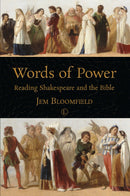Description
Shakespeare and the Bible are two titans of English-speaking culture: their image endlessly cited and recycled; their language permeating our public ceremonies and our private jokes. In Words of Power, Jem Bloomfield explores the cultural reverberations of these two collections of books, and how each era finds new meanings as they encounter works such as “Hamlet” or the Gospel of Mark.
Beginning with a shrewd examination of how we have codified and standardised their canons, deciding which books and which words are included in the official collections and which are excluded, Bloomfield charts the ways in which every generation grapples with these enigmatic and complex texts. He explores the way they are read and performed in public, the institutions that use their names to legitimise their own activities, and how the texts are quoted by politicians, lords and rappers. “Words of Power” throws modern ideas about Shakespeare and the Bible into sharp relief by contrasting them with those of our ancestors, showing how our engagements with these texts reveal as much about ourselves as their actual meanings.
Jem Bloomfield is an Assistant Professor of Literature at the University of Nottingham. A scholar of Renaissance literature, he studied at Oxford before earning his PhD from the University of Exeter. In his free time, he blogs about Shakespeare, Christianity, and feminism - and occasionally detective fiction - at quiteirregular.wordpress.com.
“This excellent study provides a fresh and intriguing approach to the cultural status of what Jem Bloomfield calls “Shakespeare and the Bible”. Engagingly written and full of surprising insights, 'Words of Power' argues for the overlap between how these texts are approached in both popular and scholarly culture. Bloomfield takes concepts from biblical scholarship and fruitfully explores how they can be used to challenge preconceptions about the way that both Shakespeare and the Bible should be read.” Beatrice Groves, Research Lecturer in Renaissance Literature, University of Oxford.
“Jem Bloomfield's lively study asks what it means to put faith in a book. It unpicks the historical contingency of both the Bible and Shakespeare's works, and demonstrates that the more interesting question is not what these books are, but what they are needed to be. By highlighting the role played by tradition, assumption and worldview in shaping reading practices, Bloomfield makes an important call for critical awareness of how words, both sacred and secular, gain their power.” Peter Kirwan, Assistant Professor in Shakespeare and Early Modern Drama, University of Nottingham.
Beginning with a shrewd examination of how we have codified and standardised their canons, deciding which books and which words are included in the official collections and which are excluded, Bloomfield charts the ways in which every generation grapples with these enigmatic and complex texts. He explores the way they are read and performed in public, the institutions that use their names to legitimise their own activities, and how the texts are quoted by politicians, lords and rappers. “Words of Power” throws modern ideas about Shakespeare and the Bible into sharp relief by contrasting them with those of our ancestors, showing how our engagements with these texts reveal as much about ourselves as their actual meanings.
Jem Bloomfield is an Assistant Professor of Literature at the University of Nottingham. A scholar of Renaissance literature, he studied at Oxford before earning his PhD from the University of Exeter. In his free time, he blogs about Shakespeare, Christianity, and feminism - and occasionally detective fiction - at quiteirregular.wordpress.com.
“This excellent study provides a fresh and intriguing approach to the cultural status of what Jem Bloomfield calls “Shakespeare and the Bible”. Engagingly written and full of surprising insights, 'Words of Power' argues for the overlap between how these texts are approached in both popular and scholarly culture. Bloomfield takes concepts from biblical scholarship and fruitfully explores how they can be used to challenge preconceptions about the way that both Shakespeare and the Bible should be read.” Beatrice Groves, Research Lecturer in Renaissance Literature, University of Oxford.
“Jem Bloomfield's lively study asks what it means to put faith in a book. It unpicks the historical contingency of both the Bible and Shakespeare's works, and demonstrates that the more interesting question is not what these books are, but what they are needed to be. By highlighting the role played by tradition, assumption and worldview in shaping reading practices, Bloomfield makes an important call for critical awareness of how words, both sacred and secular, gain their power.” Peter Kirwan, Assistant Professor in Shakespeare and Early Modern Drama, University of Nottingham.
Details
Publisher -
Language - English
Paperback
Contributors
Author
Jem Bloomfield
Published Date -
ISBN - 9780718894139
Dimensions - 22.9 x 15.2 x 1.0 cm
Page Count - 175
Payment & Security
Your payment information is processed securely. We do not store credit card details nor have access to your credit card information.


